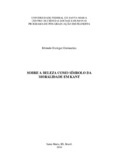| dc.creator | Guimarães, Rômulo Eisinger | |
| dc.date.accessioned | 2016-06-01 | |
| dc.date.available | 2016-06-01 | |
| dc.date.issued | 2016-02-15 | |
| dc.identifier.citation | GUIMARÃES, Rômulo Eisinger. ON THE BEAUTY AS A SYMBOL OF MORALITY IN KANT. 2016. 121 f. Dissertação (Mestrado em Filosofia) - Universidade Federal de Santa Maria, Santa Maria, 2016. | por |
| dc.identifier.uri | http://repositorio.ufsm.br/handle/1/9155 | |
| dc.description.abstract | In the Critique of the Power of Judgment Kant is concerned with the problem of Beauty s transcendental philosophy, seeking the possibility of a universally valid, a priori and necessary aesthetic judgment. The strategy adopted by the author starts by defining what the Beauty is not (in this case, a judgment of knowledge). Among other things, the complacency in Beauty is distinguished from complacency in Good, being the former disinterested, whereas the latter has an interest in the existence of the judged object. This difference is already made in the opening paragraphs of the first book of the Analytic of the Beauty. Nevertheless, insofar as Kant advances in his analysis of the feeling of the Beauty (and later, the Sublime), the author suggests that the separation between an aesthetic judgment (of the Beauty) and a moral judgment (of the Good) is not necessarily abrupt and sometimes such judgments constitute an ambiguous relationship. The work to be done intend to investigate the sinuosity of the Kantian discourse developed along the third Critique about the problem of the Beauty and the Good, especially the apparent change in Kant s argument at the §§16 and 17, and affirmation of the "Beauty as a Symbol of Morality" [KU, B253] in § 59 of this book. | eng |
| dc.description.sponsorship | Coordenação de Aperfeiçoamento de Pessoal de Nível Superior | |
| dc.format | application/pdf | por |
| dc.language | por | por |
| dc.publisher | Universidade Federal de Santa Maria | por |
| dc.rights | Acesso Aberto | por |
| dc.subject | Crítica da faculdade do juízo | por |
| dc.subject | Juízo reflexionante | por |
| dc.subject | Estética | por |
| dc.subject | Ética | por |
| dc.subject | Conhecimento relacional | por |
| dc.subject | Critique of the power of judgment | eng |
| dc.subject | Reflective judgment | eng |
| dc.subject | Aesthetics | eng |
| dc.subject | Ethics | eng |
| dc.subject | Relational knowledge | eng |
| dc.title | Sobre a beleza como símbolo da moralidade em Kant | por |
| dc.title.alternative | On the beauty as a symbol of morality in Kant | eng |
| dc.type | Dissertação | por |
| dc.description.resumo | Na Crítica da Faculdade do Juízo Kant preocupa-se com o problema da filosofia transcendental do Belo, buscando a possibilidade de um juízo estético universalmente válido, a priori e necessário. A estratégia adotada pelo autor inicia por definir o que o Belo não é (no caso, um juízo de conhecimento). Dentre outras coisas, distingue-se o comprazimento no Belo do comprazimento no Bom, sendo aquele desinteressado, ao passo que este contém um interesse na existência do objeto ajuizado. Esta diferença é feita já nos parágrafos iniciais do primeiro livro da Analítica do Belo. Não obstante, na medida em que Kant avança em sua análise sobre o sentimento do Belo (e posteriormente, do Sublime), o autor deixa transparecer que a separação entre um juízo estético (do Belo) e um juízo moral (do Bom) não é necessariamente abrupta e, por vezes, tais juízos constituem uma relação ambígua. No trabalho a ser realizado pretendo investigar a sinuosidade do discurso kantiano desenvolvido ao longo da terceira Crítica acerca da questão do Belo e do Bom, em especial a aparente mudança na argumentação de Kant a partir dos §§16 e 17, e afirmação da Beleza como Símbolo da Moralidade [KU, B253] no § 59 desta obra. | por |
| dc.contributor.advisor1 | Hamm, Christian Viktor | |
| dc.contributor.advisor1Lattes | http://buscatextual.cnpq.br/buscatextual/visualizacv.do?id=K4788328H8 | por |
| dc.contributor.referee1 | Krassuski, Jair Antônio | |
| dc.contributor.referee1Lattes | http://buscatextual.cnpq.br/buscatextual/visualizacv.do?id=K4762903P7 | por |
| dc.contributor.referee2 | Euler, Werner Ludwig | |
| dc.contributor.referee2Lattes | http://lattes.cnpq.br/1446240869427098 | por |
| dc.creator.Lattes | http://lattes.cnpq.br/8125294927808908 | por |
| dc.publisher.country | BR | por |
| dc.publisher.department | Filosofia | por |
| dc.publisher.initials | UFSM | por |
| dc.publisher.program | Programa de Pós-Graduação em Filosofia | por |
| dc.subject.cnpq | CNPQ::CIENCIAS HUMANAS::FILOSOFIA | por |


